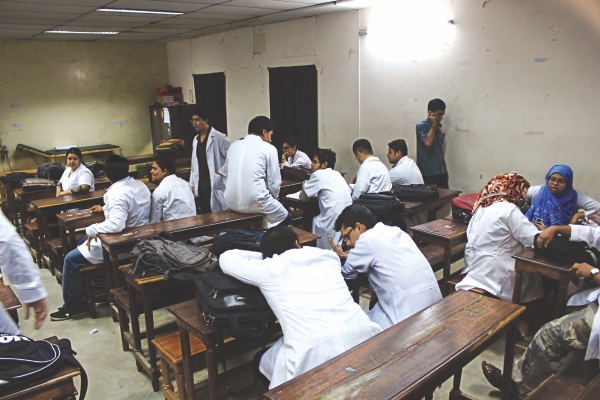Extra Credit
Revolution of the Mind
Sabhanaz Rashid Diya
On most occasions, engineers are funny people. Except when they start talking about machines more than the average and you realise you're spinning inside a cosmic circle of utter and complete ignorance (read 'indifference'). Doctors, on the other hand are quite creative. They come up with the strangest ideas that make no sense at first, and slowly, as you go past the nerves, neurons and tendons, you start grasping things under a different light. Lawyers are mean. Period.
Most people wouldn't know this. Nor would they be as opinionated as yours truly. Our perceptive windows are narrow and it's easier to assume spectacles, black suits and laboratory aprons are inherently monotonous. The horrific stories of South Asian parents replacing Halloween night, and that of young people to choose what seems today as conventional career tracks is redundant. Sure, it's not that we have broken out of our cocoons to become astronauts and Shumacher(s); but opportunities have expanded. We have writers, firefighters and copyrighters. We have musicians, chefs and humanitarian aid workers. What's even more exciting is that we have entrepreneurs, and over the past few decades, we have gone to places.

A part of us puts the 'conventional' careers on a pedestal, while the other forms a condescending opinion.
The funny thing though is it's often not business students who end up starting businesses. On the contrary, it's anyone but business majors. An engineer, a communication major, a degree in geography – seems as though thoughts are becoming things usually when they are not wrapped around the typical Business 201 textbooks. Lawyers and doctors seem to have less flexibility, and numerous reports have been published to indicate how these professions are high-end investments and leaves graduates with fewer choices. Yet, the likes of 2012 Women of the Future Awards winner Kate Hersov, has a different story to tell. Hersov founded what is coined as the world's first medical education company that uses comicbooks and storybooks to explain concepts of HIV, organ transplants and cancer to children. In other news, Phanindra Sama received his Electrical Engineering degree from BITS Pilani and went onto starting India's first online bus ticket booking service. And no, contrary to popular belief, he didn't have to pursue an MBA to add two-and-two to five.
One of my most favourite Bangladeshi photographers went to Chittagong Medical College, practices medicine at a hospital and spends the rest of his time clicking some of the most beautiful conceptual images on earth. My childhood sweetheart studied aeronautical engineering to end up designing an online gaming portal that allows users to add their programmed flash games into the site's interface, bringing a whole new twist to 'multiplayer'. Walking down memory lane, they both agreed had it not been their 'conventional' career choices, they would have never ended up doing what they love. The degree while adding flare to the resume, gave them just the right technical skills to go beyond the typical optical frame or customer model designing; and set their work apart from the crowd.
Sadly though, our minds are our greatest obstacles. A part of us puts the 'conventional' careers on a pedestal, while the other forms a condescending opinion. There is much to discover beyond what is seen and said. As the world becomes smaller, more restless and intricately diverse, our academic courses are no longer our only identity. The idea of an accountant to be seen only behind a desk at a corporate bank, a lawyer at a prestigious firm and the environmental activist hugging polar bears in the Arctic Circle is slowly dissolving. What we study only makes us smarter, not necessarily guided and constricted; and with technology rapidly evolving, innovation is becoming our favourite neighbour. On any day, I'm bound to strike a more unique and diverse conversation with the said nerds than someone otherwise – and believe a new kind of revolution has just begun.
(Sabhanaz Rashid Diya is a major in Media and Communication at Independent University Bangladesh (IUB), and founder of the nonprofit youth organization the One Degree Initiative Foundation.)
|
|
|
